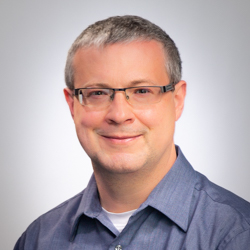Biography
Neumann received B.S. degrees in Biology and Chemistry (1997) from King College. He earned his Ph.D. in Immunology (2005) from the University of Pennsylvania under the direction of Dr. Larry Turka. Following his Ph.D. degree, he completed a Post-doctoral Research Fellowship (2011) in Innate Immune Cell Biology and Biophysics at the University of North Carolina at Chapel Hill under the mentorship of Dr. Ken Jacobson.
Personal Statement
My training and experience in Immunology, Fungal Microbiology and Quantitative Fluorescence Microscopy methods to study Cellular Biophysics have led to a fascination with the biophysics of innate immune fungal recognition as well as novel therapeutic and diagnostic approaches to fungal pathogens, such as Candida albicans. My laboratory pursues on a long-term effort to understand the nanobiology of fungal recognition from both the pathogen?s and the host?s perspective. We explore the structure and organization of Candida?s immunogenic cell wall polysaccharides and mechanisms that regulate their structure, thus determining the physical and chemical nanotopography that is perceived by responding innate immunocytes. From the host-perspective, we seek to understand the earliest events in fungal pathogen recognition by innate immunoreceptors, including the C-type lectin Dectin-1, as they bind to cell wall ligands and interact with one another in a complex web of signaling interactions. We synthesize these host- and pathogen-centric views by studying the microscale biogenesis, maturation and function of contact sites between leukocytes and Candida species pathogens. We also pursue other research emphases in the areas of anti-Candida activities of light activated antimicrobials as well as detection of Candida via spectroscopic approaches. My research program utilizes a broad array of technologies, including Super Resolution Microscopy, Fluorescence Lifetime Imaging/F”rster Resonance Energy Transfer, TIRF Microscopy, Live Cell Confocal Microscopy, Predictive Computational Modeling, Biological Force Measurements, Nanofabrication Fabrication of Biomimetic Devices, and Optical Spectroscopy. Our success is bolstered by a diverse network of collaborators and their expertise in Optical Nanoscopy and Spectroscopy, Mathematical Modeling, Semiconductor Engineering, Mechanobiology and Physical Chemistry of Biopolymers.
My teaching activities center around classroom instruction in the UNM Biomedical Sciences Graduate Program (BSGP) curriculum and research mentorship for trainees from the high-school to post-doctoral level. I particularly enjoy introducing students to the structure and function of biological membranes; receptor signaling and biophysics in immunity; computational modeling approaches to biological problems; and pathogenesis and immunobiology of infectious diseases through regular instruction in, and directorship of, several courses in our graduate biomedical curriculum. It is also a pleasure to mentor the scholarly work and career development of research trainees, including graduate students from UNM?s BSGP, Biomedical Engineering and Physics programs, through their involvement in my research aims.
Areas of Specialty
Innate Immunology
Fungal Pathogenesis
Cell Biology
Biophysics
Quantitative Fluorescence Microscopy
Languages
- English
Courses Taught
BIOM508, Cell Biology (Instructor). Biochemistry and biophysics of biological membranes and their essential roles in signaling, membrane organization, cellular ion transport and polarity determination.
BIOM522, Methods in Cell Biology (Instructor). Tools for understanding biomolecular structure and function using biomimetic mutations, chemical conjugations, and physical characterization methods.
BIOM514, Immunology (Co-director, Instructor). Coordination of a graduate-level overview of Immunology from a biomedical perspective concerning human innate and adaptive immunity and their application to various disease states such as infection, autoimmunity, allergy, immunodeficiency and cancer. Lectures taught specifically on signal transduction and biophysical aspects of immune cell activation.
BIOM652, Immunopathogenesis and Immunity in Infectious Disease (Director, Instructor). In depth exploration of the involvement of immunity and immunopathogenesis in host-defense against viral, bacterial and eukaryotic pathogens. Lectures taught specifically on fungal pathogenesis and immunity as well as hands-on instruction in the application of agent-based computational modeling to problems infection and immunity.
BIOM505(ST), Host-Pathogen Journal Club (Co-director). Weekly discussion that help students to hone their critical thinking and presentation skills as we deepen our familiarity with the current research literature in infectious disease and immunity.
Research and Scholarship
Peer-reviewed research works:
An up-to-date bibliography may be viewed at
https://www.ncbi.nlm.nih.gov/myncbi/aaron.neumann.1/bibliography/public/
Notable Research Pre-prints:
Anaya EU, Amin AE, Wester MJ, Danielson ME, Michel KS, Neumann AK. Dectin-1 Molecular Aggregation and Signaling is Sensitive to ?-Glucan Structure and Glucan Exposure on Candida albicans Cell Walls. bioRxiv. 2020 Jan 1;824995. doi: https://doi.org/10.1101/824995

